
Following three days of frantic searching through the rubble at the port of Beirut, rescue teams finally gave up on finding survivors last weekend. The people of Lebanon had hoped for a miracle, but the heart-wrenching realisation seemed to sum-up the tragedy that has engulfed Lebanon’s capital.
On August 4th, a devastating explosion ripped through the Lebanese capital. More than a month after the largest non-nuclear blast in modern history, the extent of the destruction that has been caused remains difficult to comprehend. The death of more than 200 people, with an estimated 7,000 left injured; three hospitals destroyed and a further three badly damaged; buildings, homes and vital infrastructure destroyed in a radius of 15 miles of the port.
The tragedy could hardly have come at a worse time for Lebanon. After years of appalling governance, with corruption rife at every level of government. Civil service appointments determined by factional patronage; decisions taken not in the national interest, but in the interest of a religious or political loyalty. Governments may change, but rigid constitution facilitates mean the same corrupt elites engaging in a perpetual game of musical chairs, with the same self-serving politicians trading governmental positions with one other. With such a broken political system, it is little wonder that the outpouring of grief from the people of Beirut is mixed with a deep-rooted anger.
While the politicians and their hangers-on have used positions of authority to further their own ends, Lebanon’s economy and living standards in the country have progressively worsened in recent years. Since the explosion at the port of Beirut last month, things have deteriorated further. Unemployment has surged past the 30% and over half of the country’s population find themselves living below the poverty line.
Add to this the crippling impact that the spread of Covid-19 has had on an already struggling healthcare system, and the scale of the challenge facing Lebanon becomes overwhelming. Nowhere is the problem felt more acutely than amongst the large refugee populations, predominantly those from Palestine and Syria.
It is against this backdrop that the international community has been mobilising its relief effort. The United Nations and France in particular have set ambitious goals in their efforts to provide aid. The UK has so far provided what can fairly be described as modest aid, as well as technical and logistic support.
The UN, national governments and voluntary organisations are acutely aware of the difficult logistical problems of organising a major humanitarian effort given Lebanon’s inadequate infrastructure and through governmental structures cannot frankly cannot be trusted to act in the best interest of the people. Save the Children has made clear that none of their resources go through “official institutions”, with support delivered instead through partnership with community and youth-led organisations. Co-operation with governmental institutions is limited to building capacity and targeted initiatives to prevent violence against children.
The situation in Beirut undoubtedly demands significant and long-term support, but the international community must do more. Given the scale and nature of the tragedy unfolding in Lebanon, there is no question that an independent international investigation is necessary to determine not only the cause of last month’s explosion, but also the steps necessary to avoid such a tragedy ever being allowed to happen again. The systemic negligence that allowed thousands of tons of explosive materials to be stored in such a way and in such a populated location must be laid bare, but so too must the institutional and structural failures that permitted such negligence to take place.
The Lebanese government has proven themselves incapable of undertaking such an inquiry. It must be conducted with the utmost transparency and demand genuine accountability – neither of which this administration can provide to the people of Lebanon.
The importance of such an inquiry – and the potential significance of its eventual findings – must now warrant the engagement of the United Nations. The UN Human Rights Council has the resources and expertise necessary to lead such an investigation, and should be empowered to effectively examine the circumstances that allowed this disaster to take place. The human rights of the Lebanese people would rightly be at the heart of its determinations.
For the UNHRC to lead such an inquiry would require the agreement of several nations. But first there is a requirement for at least one government to set forward such a proposal, and unite the international community behind an inquiry that offers the prospect of genuine accountability for the people of Lebanon. As a leading voice at the United Nations, we believe it should be the UK government that shows leadership on the global stage and sets forward these proposals. At a time of unimaginable grief, the people of Lebanon deserve nothing less.




More from LabourList
‘Tackling poverty should be the legacy of Keir Starmer’s government’
‘The High Court judgment brings more uncertainty for the trans community’
‘There are good and bad businesses. Labour needs to be able to explain the difference’